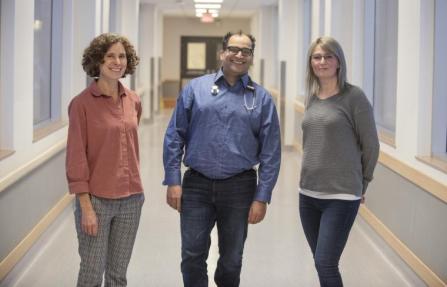- Managing your Practice
-
- Your Benefits
-

Introducing the ultimate Club MD experience
From work to play, and everything in between, we provide you with access to hundreds of deals from recognizable, best-in-class brands, elevating every facet of your life – from practice supports to entertainment, restaurants, electronics, travel, health and wellness, and more. Your Club MD membership ensures that these deals are exclusive to you, eliminating the need to search or negotiate.
Welcome to the ultimate Club MD experience. Your membership, your choices, your journey.
-
- Advocacy & Policy
-
- Collaboration
- News & Events
-

Stay Informed
Stay up to date with important information that impacts the profession and your practice. Doctors of BC provides a range of newsletters that target areas of interest to you.
Subscribe to the President's Letter
Subscribe to Newsletters
-
- About Us
-
JCCs - Family doctors and specialists work together to improve patient health pre- and post-surgery
April 5, 2022
News
The Joint Collaborative Committees (JCCs) are a unique partnership of Doctors of BC and the BC government. Funded through the Physician Master Agreement, the four committees bring together doctors, government, and health authorities to improve patient access to care, encourage innovation, and strengthen physician leadership. Doctors of BC is highlighting a series of stories that show how the JCCs are making a positive difference for patients, doctors and the health care system.
Bring together family doctors and specialists, a team of other health care professionals, and the right supports to spur innovation - and magic happens.
Urologist Dr Alym Abdulla, family physician Dr Rachel McGhee and a surgical support team at University Hospital of Northern BC (UHNBC) are great examples of this. With funding and support from all four Joint Collaborative Committees, the team prepares patients for elective surgery by helping to manage their health challenges before they go into the operating room.
Called “prehabilitation”, the team works with patients to eliminate or reduce barriers such as managing chronic conditions and addressing mental health issues or gaps in social supports. It’s great for patients, who recover faster. It’s good for the medical team, as surgeries are more efficient and less likely to have complications. And it eases pressure on BC’s health care system.
“Before SPOC, I had a number of patients whose surgeries were cancelled on the day of surgery because of other underlying health issues that were identified too late,” says Dr Abdulla. This meant the surgery had to be rebooked–taxing the health care system, misspending the care team’s time, and prolonging the period patients felt unwell and used medical resources until they were ready for surgery again.

There is an important long-term benefit too. Dr McGhee, who is also a member of Prince George Division of Family Practice, notes that patients who have finite goals such as a desire to quit smoking, improve nutrition or increase daily exercise before surgery will often carry these good habits beyond their surgical recovery.
The Surgical Patient Optimization Collaborative (SPOC) effort is truly a team effort – the team at UHNBC includes seven physicians, a nurse navigator, a physiotherapist, a social worker, and a community services manager. Similar teams are now operating at 14 hospitals in BC, all funded by the JCCs. The next cohort of teams will start their journey in April 2022, and will be supported by the Specialist Services Committee and Shared Care which will facilitate communications and coordination between patients, specialists, family physicians and health authorities.
To establish and implement preoperative optimization at UHNBC, the support team met every two weeks to brainstorm ideas, identify realistic ways to make the program work, and consult with key health partners—including the local division to help define the family doctor’s role in the process. As consultations also revealed the importance and value of a nurse navigator to the process, the team welcomed Nicole Dron. Patients who have been assessed as needing prehabilitation by a physician connect with Nicole. Nicole not only directs patients to prehabilitation resources for the domains identified by the doctor, but she also maintains regular contact with the patient throughout the process.
“This regular connection [to Nicole] helped to keep my anxiety down because I was able to have questions quickly answered and not running around in my head for too long,” shares Sharlene Logan, a hip replacement patient living in Quesnel. “I felt like I was part of a team.” Read more about Sharlene’s experience.
Dr Abdulla says he mentions the program to his patients to help educate and empower them to take charge of their own health, as well as to reaffirm how the team is integrated and collectively committed to their well-being.
Despite the COVID-19 pandemic slowing down the preoperative optimization efforts, the team continues to plan to expand their site team with an orthopedic surgeon, and for key elements needed for its long-term success including effective and supportive leadership, engagement from critical care areas, and belief in having the ability and resources.
The team agrees that collaboration is the key to success. They put in the time, often after hours, and it leads to successful and meaningful outcomes. The team agrees, and hopes to see funding continue as the initiative expands to new communities.




